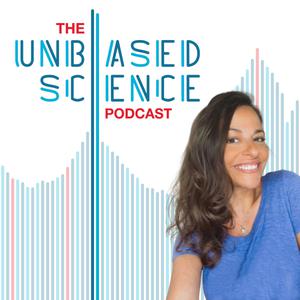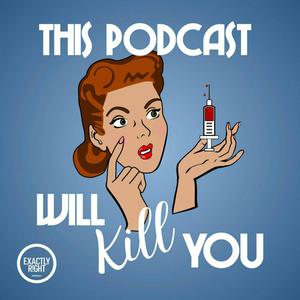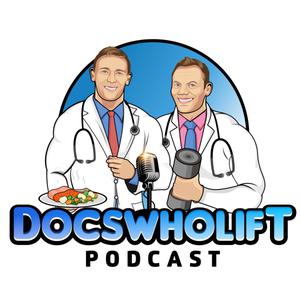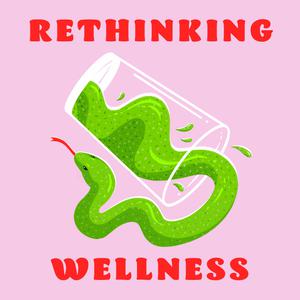
Unbiased Science
@unbiasedscipod
- 39 minutes 54 secondsSugar, We're Goin' Down (A Diabetes Rabbit Hole)!
In this episode, Dr. Jessica Steier and Dr. Sarah Scheinman welcome Dr. Sam Scott to explore diabetes, a condition affecting millions globally. The scientists examine different types of diabetes, current management approaches, and technological innovations in diabetes care. They discuss the crucial role of exercise in diabetes management while addressing the everyday challenges faced by individuals living with the condition, offering listeners valuable insights into both traditional and emerging strategies for diabetes care.
All our sources from this episode are available at: https://www.unbiasedscipod.com/episodes/
(00:00) Intro and Understanding Diabetes: A Global Perspective
(10:32) Types of Diabetes: Definitions and Differences
(20:14) The Role of Exercise in Diabetes Management
(30:09) Technology and Diabetes: Continuous Glucose Monitoring
(40:11) Final Thoughts: Innovations in Diabetes Care: Enhanced and Community Support
Interested in advertising with us? Please reach out to [email protected], with “Unbiased Science” in the subject line.
PLEASE NOTE: The discussion and information provided in this podcast are for general educational, scientific, and informational purposes only and are not intended as, and should not be treated as, medical or other professional advice for any particular individual or individuals. Every person and medical issue is different, and diagnosis and treatment requires consideration of specific facts often unique to the individual. As such, the information contained in this podcast should not be used as a substitute for consultation with and/or treatment by a doctor or other medical professional. If you are experiencing any medical issue or have any medical concern, you should consult with a doctor or other medical professional.
Further, due to the inherent limitations of a podcast such as this as well as ongoing scientific developments, we do not guarantee the completeness or accuracy of the information or analysis provided in this podcast, although, of course we always endeavor to provide comprehensive information and analysis. In no event may Unbiased Science or any of the participants in this podcast be held liable to the listener or anyone else for any decision allegedly made or action allegedly taken or not taken allegedly in reliance on the discussion or information in this podcast or for any damages allegedly resulting from such reliance. The information provided herein do not represent the views of our employers.
Learn more about your ad choices. Visit megaphone.fm/adchoices
22 January 2025, 11:00 am - 43 minutes 52 secondsNot To Poo-Poo Microbiome Research, Butt We're Just Getting To The Bottom Of It
In this episode, Dr. Jessica Steier and Dr. Sarah Scheinman welcome Dr. Kristen Panthagani to explore the complex world of the human microbiome. The scientists discuss the fundamental concepts of gut health, examining the roles of beneficial and harmful bacteria, as well as the effects of probiotics, prebiotics, and antibiotics. They investigate the emerging research on the gut-brain connection and its implications for mental health, while addressing the effectiveness of various interventions including dietary changes and supplements. Throughout the conversation, they emphasize the importance of evidence-based approaches to microbiome health and discuss future directions in this rapidly evolving field of research.
All our sources from this episode are available at: https://www.unbiasedscipod.com/episodes/
(00:00) Intro
(00:20) Introduction to the Microbiome and Its Importance
(03:20) Understanding the Microbiome: Definitions and Types
(06:21) Good vs. Bad Bacteria: Simplifications and Realities
(09:20) Probiotics, Prebiotics, and Antibiotics: Key Differences
(12:22) The Role of Diet in Microbiome Health
(15:15) The Microbiome's Connection to Health and Disease
(18:20) Advancements in Microbiome Research
(21:22) The Fluid Nature of the Microbiome
(24:09) At-Home Microbiome Testing: Insights and Critiques
(25:06) The Importance of Fiber for Gut Health
(25:25) Probiotics: Are They Worth It?
(30:49) Antibiotics and Their Impact on the Microbiome
(32:41) Understanding the Gut-Brain Axis
(38:26) Final Thoughts: The Future of Microbiome Research
Interested in advertising with us? Please reach out to [email protected], with “Unbiased Science” in the subject line.
PLEASE NOTE: The discussion and information provided in this podcast are for general educational, scientific, and informational purposes only and are not intended as, and should not be treated as, medical or other professional advice for any particular individual or individuals. Every person and medical issue is different, and diagnosis and treatment requires consideration of specific facts often unique to the individual. As such, the information contained in this podcast should not be used as a substitute for consultation with and/or treatment by a doctor or other medical professional. If you are experiencing any medical issue or have any medical concern, you should consult with a doctor or other medical professional.
Further, due to the inherent limitations of a podcast such as this as well as ongoing scientific developments, we do not guarantee the completeness or accuracy of the information or analysis provided in this podcast, although, of course we always endeavor to provide comprehensive information and analysis. In no event may Unbiased Science or any of the participants in this podcast be held liable to the listener or anyone else for any decision allegedly made or action allegedly taken or not taken allegedly in reliance on the discussion or information in this podcast or for any damages allegedly resulting from such reliance. The information provided herein do not represent the views of our employers.
Learn more about your ad choices. Visit megaphone.fm/adchoices
15 January 2025, 11:00 am - 39 minutes 58 secondsNews Year, Who Dis? 2025's First Health and Science Stories
In this episode, Dr. Jessica Steier and Dr. Sarah Scheinman explore a diverse range of current scientific topics, from seasonal illnesses to cutting-edge biotechnology. The scientists discuss the mechanisms behind winter disease outbreaks, particularly focusing on colds and norovirus. They examine recent developments in xenotransplantation and gene editing technology, while also addressing emerging public health concerns such as HMPV and the relationship between alcohol and cancer. The conversation covers innovative medical approaches including psychedelic therapy, offering listeners a comprehensive overview of various contemporary health and scientific developments.
All our sources from this episode are available at: https://www.unbiasedscipod.com/episodes/
(00:00) Intro
(02:35) Holiday Chaos and New Beginnings
(04:45) Exploring Seasonal Illnesses
(09:46) The Rise of Norovirus Outbreaks
(15:53) Advancements in Xenotransplantation
(19:57) Future of Biotechnology and Research
(20:51) Xenotransplantation: A New Frontier
(22:38) Understanding HMPV and Public Health Concerns
(27:27) Psychedelic Therapy: Controversies and Potential
(32:32) Final Thoughts: Alcohol and Cancer: A Call for Awareness
Interested in advertising with us? Please reach out to [email protected], with “Unbiased Science” in the subject line.
PLEASE NOTE: The discussion and information provided in this podcast are for general educational, scientific, and informational purposes only and are not intended as, and should not be treated as, medical or other professional advice for any particular individual or individuals. Every person and medical issue is different, and diagnosis and treatment requires consideration of specific facts often unique to the individual. As such, the information contained in this podcast should not be used as a substitute for consultation with and/or treatment by a doctor or other medical professional. If you are experiencing any medical issue or have any medical concern, you should consult with a doctor or other medical professional.
Further, due to the inherent limitations of a podcast such as this as well as ongoing scientific developments, we do not guarantee the completeness or accuracy of the information or analysis provided in this podcast, although, of course we always endeavor to provide comprehensive information and analysis. In no event may Unbiased Science or any of the participants in this podcast be held liable to the listener or anyone else for any decision allegedly made or action allegedly taken or not taken allegedly in reliance on the discussion or information in this podcast or for any damages allegedly resulting from such reliance. The information provided herein do not represent the views of our employers.
Learn more about your ad choices. Visit megaphone.fm/adchoices
8 January 2025, 11:00 am - 41 minutesThat's So Meta: Your Brain On Social Media
In this episode, Dr. Jessica Steier and Dr. Sarah Scheinman are joined by Dr. Hansa Bhargava to explore the complex relationship between social media and health, with a particular focus on its impact on children and adolescents. The scientists examine the nuanced differences between screen time and social media, discussing the potential mental health consequences of excessive digital engagement. Dr. Bhargava provides expert insights on the psychological effects of social media and offers practical guidance for parents navigating this challenging landscape. The conversation highlights the importance of communication, potential addiction risks, and the need for supportive strategies to help young people develop healthy digital habits.
All our sources from this episode are available at: https://www.unbiasedscipod.com/episodes/
(00:00) Intro Music
(00:20) Introduction & The Impact of Social Media on Health
(04:49) Defining Social Media vs. Screen Time
(10:24) The Effects of Social Media on Mental Health
(16:59) Legislation and Parental Guidance on Social Media
(21:28) Understanding Addiction and Dopamine
(29:11) Practical Tips for Parents
(38:04) Final Thoughts: Wellness and Connection
Interested in advertising with us? Please reach out to [email protected], with “Unbiased Science” in the subject line.
PLEASE NOTE: The discussion and information provided in this podcast are for general educational, scientific, and informational purposes only and are not intended as, and should not be treated as, medical or other professional advice for any particular individual or individuals. Every person and medical issue is different, and diagnosis and treatment requires consideration of specific facts often unique to the individual. As such, the information contained in this podcast should not be used as a substitute for consultation with and/or treatment by a doctor or other medical professional. If you are experiencing any medical issue or have any medical concern, you should consult with a doctor or other medical professional.
Further, due to the inherent limitations of a podcast such as this as well as ongoing scientific developments, we do not guarantee the completeness or accuracy of the information or analysis provided in this podcast, although, of course we always endeavor to provide comprehensive information and analysis. In no event may Unbiased Science or any of the participants in this podcast be held liable to the listener or anyone else for any decision allegedly made or action allegedly taken or not taken allegedly in reliance on the discussion or information in this podcast or for any damages allegedly resulting from such reliance. The information provided herein do not represent the views of our employers.
Learn more about your ad choices. Visit megaphone.fm/adchoices
18 December 2024, 11:00 am - 39 minutes 28 secondsFluoride and Prejudice: Getting To The Root of This Controversial Mineral
In this episode, Dr. Jessica Steier and Dr. Sarah Scheinman explore the complex and controversial topic of fluoride in public health. The scientists examine the recent National Toxicology Program report linking fluoride to potential cognitive impacts, discussing its historical significance and the ongoing debates about its use in water supplies. They delve into the nuanced considerations of fluoride's benefits and risks, addressing concerns about dental health, potential cognitive effects, and health equity. The conversation provides a balanced perspective on fluoride, highlighting the importance of scientific evidence in understanding its role in public health and dental care.
All our sources from this episode are available at: https://www.unbiasedscipod.com/episodes/
(00:00) Introduction
(03:29) Understanding Fluoride: Definition and Function
(06:19) Historical Context of Fluoride and Dental Health
(09:21) Recent Controversies: NTP Report and IQ Concerns
(12:13) Fluoride: Benefits vs. Risks
(15:22) Health Equity and Access to Dental Care
(18:30) Fluorosis: Understanding the Condition
(21:06) IQ: What It Is and Its Measurement Challenges
(24:20) The Connection Between Dental Health and Cognitive Function
(27:20) Consequences of Removing Fluoride from Water
(30:21) Hydroxyapatite as an Alternative to Fluoride
(33:20) Final Thoughts: Conclusion on Fluoride
Interested in advertising with us? Please reach out to [email protected], with “Unbiased Science” in the subject line.
PLEASE NOTE: The discussion and information provided in this podcast are for general educational, scientific, and informational purposes only and are not intended as, and should not be treated as, medical or other professional advice for any particular individual or individuals. Every person and medical issue is different, and diagnosis and treatment requires consideration of specific facts often unique to the individual. As such, the information contained in this podcast should not be used as a substitute for consultation with and/or treatment by a doctor or other medical professional. If you are experiencing any medical issue or have any medical concern, you should consult with a doctor or other medical professional.
Further, due to the inherent limitations of a podcast such as this as well as ongoing scientific developments, we do not guarantee the completeness or accuracy of the information or analysis provided in this podcast, although, of course we always endeavor to provide comprehensive information and analysis. In no event may Unbiased Science or any of the participants in this podcast be held liable to the listener or anyone else for any decision allegedly made or action allegedly taken or not taken allegedly in reliance on the discussion or information in this podcast or for any damages allegedly resulting from such reliance. The information provided herein do not represent the views of our employers.
Learn more about your ad choices. Visit megaphone.fm/adchoices
11 December 2024, 11:00 am - 48 minutes 26 secondsBlurred Lines: Navigating Bias in the Scientific Method
In this episode, Dr. Jessica Steier and Dr. Sarah Scheinman are joined by Dr. Kristen Panthagani to explore the fundamental aspects of science communication and methodology. The scientists discuss the delicate balance between scientific certainty and uncertainty, examining how cognitive biases influence both research and public understanding. They address the challenges of communicating complex scientific findings to the public, particularly in contexts like vaccine hesitancy and widespread misinformation. The conversation emphasizes the importance of building trust through effective communication while maintaining scientific integrity, offering listeners valuable insights into critically evaluating and understanding scientific research.
All our sources from this episode are available at: https://www.unbiasedscipod.com/episodes/
(00:00) Introduction
(03:18) Understanding Science: What It Is and Isn't
(06:10) The Nature of Scientific Certainty and Uncertainty
(09:17) The Scientific Method: Steps and Challenges
(12:32) Communicating Science: Best Practices and Challenges
(15:34) The Role of Trust in Science Communication
(18:14) Addressing Misinformation and Vaccine Hesitancy
(26:14) Shared Values in Health Communication
(27:39) Understanding Cognitive Biases
(30:32) Types of Cognitive Biases in Science
(36:49) Strategies to Reduce Bias in Research
(43:26) The Importance of Research Design
(47:03) Final Thoughts: Communicating Uncertainty in Science
Interested in advertising with us? Please reach out to [email protected], with “Unbiased Science” in the subject line.
PLEASE NOTE: The discussion and information provided in this podcast are for general educational, scientific, and informational purposes only and are not intended as, and should not be treated as, medical or other professional advice for any particular individual or individuals. Every person and medical issue is different, and diagnosis and treatment requires consideration of specific facts often unique to the individual. As such, the information contained in this podcast should not be used as a substitute for consultation with and/or treatment by a doctor or other medical professional. If you are experiencing any medical issue or have any medical concern, you should consult with a doctor or other medical professional.
Further, due to the inherent limitations of a podcast such as this as well as ongoing scientific developments, we do not guarantee the completeness or accuracy of the information or analysis provided in this podcast, although, of course we always endeavor to provide comprehensive information and analysis. In no event may Unbiased Science or any of the participants in this podcast be held liable to the listener or anyone else for any decision allegedly made or action allegedly taken or not taken allegedly in reliance on the discussion or information in this podcast or for any damages allegedly resulting from such reliance. The information provided herein do not represent the views of our employers.
Learn more about your ad choices. Visit megaphone.fm/adchoices
4 December 2024, 11:00 am - 59 minutes 38 secondsCancer Cells Gone Wild: Real Biology Exposed
In this episode, Dr. Jessica Steier and Dr. Sarah Scheinman discuss the complexities of cancer with Dr. Joe Zundell, a cancer biologist. They explore the definition of cancer, its prevalence, and the hallmarks that characterize cancer cells. The conversation delves into the mechanisms of cancer growth, including sustaining proliferative signaling, evading growth suppression through the P53 gene, and the process of apoptosis. The discussion aims to make these complex topics accessible to a broader audience while highlighting the importance of understanding cancer biology. In this conversation, Dr. Joe Zundell discusses the complexities of cancer biology, focusing on key hallmarks such as immune response, replicative immortality, angiogenesis, and metastasis. He emphasizes the importance of early detection and the challenges of targeting cancer cells without affecting healthy cells. The discussion highlights the need for careful consideration of information regarding cancer treatment and the significance of working with healthcare professionals.
All our sources from this episode are available at: https://www.unbiasedscipod.com/episodes/
(00:00) Introduction
(05:28) Understanding Cancer: Definitions and Statistics
(10:15) The Hallmarks of Cancer: An Overview
(15:14) Sustaining Proliferative Signaling in Cancer
(20:07) Evading Growth Suppression: The Role of P53
(25:17) Apoptosis: The Controlled Cell Death Mechanism
(30:21) Understanding Cancer: Immune Response and Cell Death
(33:31) Replicative Immortality: The Hayflick Limit
(38:27) Angiogenesis: Blood Vessel Formation in Tumors
(46:32) Invasion and Metastasis: The Spread of Cancer
(54:22) Final Thoughts: The Complexity of Cancer Treatment and Early Detection
Interested in advertising with us? Please reach out to [email protected], with “Unbiased Science” in the subject line.
PLEASE NOTE: The discussion and information provided in this podcast are for general educational, scientific, and informational purposes only and are not intended as, and should not be treated as, medical or other professional advice for any particular individual or individuals. Every person and medical issue is different, and diagnosis and treatment requires consideration of specific facts often unique to the individual. As such, the information contained in this podcast should not be used as a substitute for consultation with and/or treatment by a doctor or other medical professional. If you are experiencing any medical issue or have any medical concern, you should consult with a doctor or other medical professional.
Further, due to the inherent limitations of a podcast such as this as well as ongoing scientific developments, we do not guarantee the completeness or accuracy of the information or analysis provided in this podcast, although, of course we always endeavor to provide comprehensive information and analysis. In no event may Unbiased Science or any of the participants in this podcast be held liable to the listener or anyone else for any decision allegedly made or action allegedly taken or not taken allegedly in reliance on the discussion or information in this podcast or for any damages allegedly resulting from such reliance. The information provided herein do not represent the views of our employers.
Learn more about your ad choices. Visit megaphone.fm/adchoices
20 November 2024, 11:00 am - 39 minutes 48 secondsThe ABCs of The FDA: America’s Public Health Regulatory Agency
In this episode, Dr. Jessica Steier and Dr. Sarah Scheinman welcome Dr. Namandjé Bumpus, Principal Deputy Commissioner of the FDA, who shares insights into the agency's operations and her path from academia to FDA leadership. The scientists explore the complexities of drug approval processes, the FDA's organizational structure, and its commitment to safety and transparency. Dr. Bumpus discusses the agency's efforts to advance health equity and adapt to emerging technologies, while addressing the critical challenge of maintaining public trust. This conversation offers listeners a unique glimpse into the inner workings of the FDA and its role in protecting public health.
All our sources from this episode are available at: https://www.unbiasedscipod.com/episodes/
(00:00) Introduction
(03:31) Dr. Bumpus' Academic and Professional Journey
(06:19) Transition from Academia to FDA Leadership
(09:10) The Role of Pharmacology in Public Health
(12:26) Overview of FDA Offices and Centers
(15:10) Understanding the Drug Approval Process
(18:12) Post-Market Surveillance and Drug Safety
(21:20) Building Trust in Government Agencies
(24:27) Examples of FDA's Impact on Public Health
(27:16) Ensuring Transparency in FDA Processes
(30:27) The Human Foods Program and Its Importance
(33:08) Adapting to Rapidly Evolving Technologies
(36:16) Challenges Facing the FDA and Public Health
(38:42) Final Thoughts
Interested in advertising with us? Please reach out to [email protected], with “Unbiased Science” in the subject line.
PLEASE NOTE: The discussion and information provided in this podcast are for general educational, scientific, and informational purposes only and are not intended as, and should not be treated as, medical or other professional advice for any particular individual or individuals. Every person and medical issue is different, and diagnosis and treatment requires consideration of specific facts often unique to the individual. As such, the information contained in this podcast should not be used as a substitute for consultation with and/or treatment by a doctor or other medical professional. If you are experiencing any medical issue or have any medical concern, you should consult with a doctor or other medical professional.
Further, due to the inherent limitations of a podcast such as this as well as ongoing scientific developments, we do not guarantee the completeness or accuracy of the information or analysis provided in this podcast, although, of course we always endeavor to provide comprehensive information and analysis. In no event may Unbiased Science or any of the participants in this podcast be held liable to the listener or anyone else for any decision allegedly made or action allegedly taken or not taken allegedly in reliance on the discussion or information in this podcast or for any damages allegedly resulting from such reliance. The information provided herein do not represent the views of our employers.
Learn more about your ad choices. Visit megaphone.fm/adchoices
13 November 2024, 11:00 am - 49 minutes 58 secondsCan't Get You Out of My Head: Debunking Brain Health Misinformation
In this episode, Dr. Jessica Steier and Dr. Sarah Scheinman are joined by Dr. Ayesha Sherzai to explore brain health, with a focus on dementia and Alzheimer's disease. The scientists address common misconceptions and examine evidence-based approaches to cognitive health, including the role of nutrition, supplements, and music therapy. They debunk popular myths about brain usage and detoxification while emphasizing the importance of engaging in meaningful activities for cognitive resilience. Throughout the conversation, the experts highlight the intimate connection between brain health and overall well-being, providing listeners with reliable information to counter widespread misinformation in this field.
All our sources from this episode are available at: https://www.unbiasedscipod.com/episodes/
(00:00) Introduction
(03:19) Understanding Dementia and Its Impact
(06:28) The Role of Nutrition in Brain Health
(09:19) Debunking Brain Health Supplements
(12:15) The Placebo Effect and Patient Care
(15:08) The Mozart Effect and Music Therapy
(27:41) The Therapeutic Power of Music
(34:28) Brain Training Games: Myths and Realities
(38:00) Detoxing the Brain: Fact or Fiction?
(41:02) Final Thoughts: Debunking Brain Myths: 10% Usage and Lateralization
Interested in advertising with us? Please reach out to [email protected], with “Unbiased Science” in the subject line.
PLEASE NOTE: The discussion and information provided in this podcast are for general educational, scientific, and informational purposes only and are not intended as, and should not be treated as, medical or other professional advice for any particular individual or individuals. Every person and medical issue is different, and diagnosis and treatment requires consideration of specific facts often unique to the individual. As such, the information contained in this podcast should not be used as a substitute for consultation with and/or treatment by a doctor or other medical professional. If you are experiencing any medical issue or have any medical concern, you should consult with a doctor or other medical professional.
Further, due to the inherent limitations of a podcast such as this as well as ongoing scientific developments, we do not guarantee the completeness or accuracy of the information or analysis provided in this podcast, although, of course we always endeavor to provide comprehensive information and analysis. In no event may Unbiased Science or any of the participants in this podcast be held liable to the listener or anyone else for any decision allegedly made or action allegedly taken or not taken allegedly in reliance on the discussion or information in this podcast or for any damages allegedly resulting from such reliance. The information provided herein do not represent the views of our employers.
Learn more about your ad choices. Visit megaphone.fm/adchoices
6 November 2024, 11:00 am - 42 minutes 26 secondsHello Darkness My Old Friend: Seasonal Affective Disorder
In this episode, Dr. Jessica Steier and Dr. Sarah Scheinman welcome clinical psychologist Dr. Nicole Lippman-Barile to explore Seasonal Affective Disorder (SAD). The scientists examine the clinical criteria, symptoms, and biological mechanisms underlying SAD, while addressing both winter and summer variations of the condition. They discuss evidence-based treatment approaches, including light therapy, medication, and psychotherapy, emphasizing the legitimacy of SAD as a mental health condition. The conversation provides practical strategies for managing seasonal mood changes and fatigue, offering listeners valuable insights into understanding and treating this common disorder.
All our sources from this episode are available at: https://www.unbiasedscipod.com/episodes/
(00:00) Introduction
(03:18) Understanding the Symptoms and Prevalence of SAD
(06:16) Clinical Criteria and Diagnosis of SAD
(09:11) Biological Mechanisms Behind SAD
(12:32) Treatment Options for Seasonal Affective Disorder
(15:16) Heard from the Herd: Listener Questions on SAD
(21:45) Combating Fatigue in Darker Months
(26:05) Understanding Light Therapy and Its Effects
(30:19) The Vitamin D Debate
(34:42) Legitimizing Seasonal Affective Disorder
(37:07) Final Thoughts: Exploring Reverse SAD and Its Implications
Interested in advertising with us? Please reach out to [email protected], with “Unbiased Science” in the subject line.
PLEASE NOTE: The discussion and information provided in this podcast are for general educational, scientific, and informational purposes only and are not intended as, and should not be treated as, medical or other professional advice for any particular individual or individuals. Every person and medical issue is different, and diagnosis and treatment requires consideration of specific facts often unique to the individual. As such, the information contained in this podcast should not be used as a substitute for consultation with and/or treatment by a doctor or other medical professional. If you are experiencing any medical issue or have any medical concern, you should consult with a doctor or other medical professional.
Further, due to the inherent limitations of a podcast such as this as well as ongoing scientific developments, we do not guarantee the completeness or accuracy of the information or analysis provided in this podcast, although, of course we always endeavor to provide comprehensive information and analysis. In no event may Unbiased Science or any of the participants in this podcast be held liable to the listener or anyone else for any decision allegedly made or action allegedly taken or not taken allegedly in reliance on the discussion or information in this podcast or for any damages allegedly resulting from such reliance. The information provided herein do not represent the views of our employers.
Learn more about your ad choices. Visit megaphone.fm/adchoices
30 October 2024, 10:00 am - 50 minutes 30 secondsCall Me On Your Immunome: Mapping the Human Immune System
In this episode, Dr. Jessica Steier and Dr. Sarah Scheinman are joined by the leaders of the Human Immunome Project to explore groundbreaking research in immunology. The scientists discuss the project's mission to comprehensively map and understand the human immune system, emphasizing the importance of studying diverse populations through longitudinal research. They delve into the complexities of immune system dynamics, modern immunotherapy advances, and the development of predictive models for precision medicine. The conversation highlights how this ambitious collaborative effort integrates existing data while pioneering new methodologies, offering listeners insight into the future of personalized healthcare through innovative immune system research.
All our sources from this episode are available at: https://www.unbiasedscipod.com/episodes/
Interested in advertising with us? Please reach out to [email protected], with “Unbiased Science” in the subject line.
PLEASE NOTE: The discussion and information provided in this podcast are for general educational, scientific, and informational purposes only and are not intended as, and should not be treated as, medical or other professional advice for any particular individual or individuals. Every person and medical issue is different, and diagnosis and treatment requires consideration of specific facts often unique to the individual. As such, the information contained in this podcast should not be used as a substitute for consultation with and/or treatment by a doctor or other medical professional. If you are experiencing any medical issue or have any medical concern, you should consult with a doctor or other medical professional.
Further, due to the inherent limitations of a podcast such as this as well as ongoing scientific developments, we do not guarantee the completeness or accuracy of the information or analysis provided in this podcast, although, of course we always endeavor to provide comprehensive information and analysis. In no event may Unbiased Science or any of the participants in this podcast be held liable to the listener or anyone else for any decision allegedly made or action allegedly taken or not taken allegedly in reliance on the discussion or information in this podcast or for any damages allegedly resulting from such reliance. The information provided herein do not represent the views of our employers.
Learn more about your ad choices. Visit megaphone.fm/adchoices
23 October 2024, 10:00 am - More Episodes? Get the App
Your feedback is valuable to us. Should you encounter any bugs, glitches, lack of functionality or other problems, please email us on [email protected] or join Moon.FM Telegram Group where you can talk directly to the dev team who are happy to answer any queries.
 Your Nutrition Prescription Podcast
Your Nutrition Prescription Podcast
 This Podcast Will Kill You
This Podcast Will Kill You
 Conspirituality
Conspirituality
 Maintenance Phase
Maintenance Phase
 Docs Who Lift
Docs Who Lift
 Rethinking Wellness
Rethinking Wellness